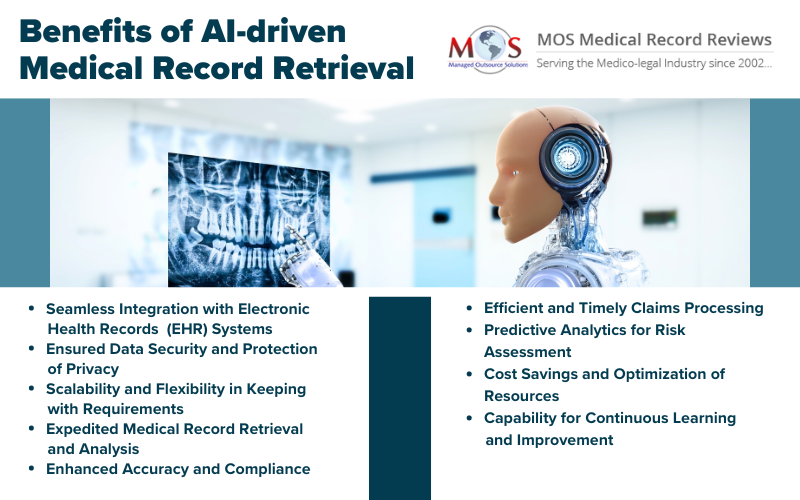Medical record retrieval is an important, resource-intensive process for healthcare providers, insurers and insurance attorneys. A complete data collection and review process is vital to optimize the retrieval process and ensure the records are accurate, comprehensive and timely. Delays in the retrieval process and errors in the records can lead to significant under or overpayments, and have a negative impact on quality reporting. It is therefore essential for insurance companies, insurance attorneys, healthcare providers and others who need medical records for case evaluation, claims processing, and litigation proceedings to address procurement challenges efficiently. Utilizing medical record retrieval services is a practical way of ensuring that you get the records you need within the specific time frame.
MOS provides timely medical record retrieval and review services for payors and insurance attorneys.
Start Free Trial Now!
Medical Record Retrieval Challenges and Concerns
Let us first look at the challenges involved in retrieving medical records. One of the major concerns in this regard is the lack of data veracity and lack of clarity as to where the record requests should be sent. Hospitals and physician practices are typically overwhelmed by large-volume medical record requests from insurers who need them for insurance reimbursement purposes, HEDIS audits and risk adjustment reviews. A serious challenge for insurance companies is the inconsistency regarding how healthcare providers receive and process ROI or Release of Information requests. There are provider organizations having multiple entry points for these requests. Also, workflow changes contribute to delays in medical record retrieval.
Traditionally, the retrieval and review of medical records have been labor-intensive, time-consuming, and prone to delays. However, the integration of Artificial Intelligence (AI) technology has revolutionized the process of medical record retrieval, offering attorneys and insurance companies efficient solutions for accessing and analyzing medical documentation. AI is proving to be a great help in streamlining workflows. It is also capable of addressing many existing and future challenges. When ROI is automated, it helps providers lessen the incidence of missed deadlines and related hassles. This in turn helps reduce payor-provider friction.
Positive Impact of AI on Medical Record Retrieval
- Electronic Health Records (EHR) Integration: AI technology allows flawless integration with EHR systems and allows direct access to the information contained in the medical records. AI-powered retrieval systems can retrieve up-to-date medical records in real time, allowing for timely case review and decision-making for insurers and attorneys.
- Improved Accuracy and Compliance: AI technology can help improve the accuracy of the retrieval process and minimize the risk of overlooking pertinent information. The AI system’s adherence to regulatory compliance standards improves data security and confidentiality, protecting sensitive patient information throughout the retrieval process.
- Security of Data and Confidentiality: AI-powered medical record retrieval platforms employ strong encryption protocols and access controls to safeguard sensitive medical data. These platforms adhere to industry standards and regulatory requirements and thereby ensure compliance with data privacy laws. They also mitigate the risk of unauthorized access or data breaches. Safety measures such as end-to-end encryption and multi-factor authentication help protect client data.
- Scalability and Flexibility: AI technology provides scalability to handle varying volumes of medical record requests and data processing requirements. Moreover, these systems can adapt to changing workload demands, irrespective of the volume of records, ensuring uniform performance and efficiency.
- Efficient Claims Processing: Insurance claims adjusters require access to claimants’ medical records to evaluate the extent of injuries sustained and the eligibility for coverage. AI-powered medical document retrieval tools integrated into the claims processing workflow quickly retrieves and summarizes the correct medical records, providing the adjuster with actionable insights for claim evaluation. The insurance company can quickly arrive at a proper decision without undue delay in claims processing. The streamlined retrieval and analysis of medical records also enable claims adjusters to adjudicate claims more efficiently, thereby boosting customer satisfaction and operational efficiency.
- Quick Record Retrieval and Analysis: AI-powered record retrieval platforms utilize natural language processing (NLP) algorithms to automate the retrieval process. The system swiftly gathers all relevant medical records from disparate sources and organizes them for review. This helps reduce the time and resources necessary for manual document requests. Legal teams gaining quick access to medical data can quickly evaluate the case and formulate a good strategy for pursuing compensation in personal injury cases. Payors also find this useful because they can speed up claims processing and ensure timely payment to members.
- Predictive Analytics for Risk Assessment: AI algorithms embedded within the retrieval systems utilize predictive analytics to evaluate the risk associated with certain medical conditions, treatment outcomes, or claims patterns. By reviewing historical data and identifying predictive patterns, these systems assist attorneys and insurance companies in evaluating case viability, assessing potential liabilities, and improving claims management approaches. AI technology can quickly identify patterns indicative of fraudulent or high-risk claims. By proactively flagging suspicious claims for further examination, insurance companies can alleviate the risk of fraudulent activity and minimize financial losses.
- Cost Savings and Optimization of Resources: AI-driven medical record retrieval platforms utilize predictive analytics to prioritize document requests and assign resources effectively. Such platforms are a great boon for large insurance companies that need access to and review of hundreds of thousands of medical records to manage high volume of claims. By harnessing the predictive capabilities of AI, the insurance company can minimize redundant document requests, optimize resource allocation, and reduce administrative overhead. The cost savings ensured by AI-driven efficiencies contribute to enhanced profitability and competitiveness in the insurance market.
- Continuous Learning and Improvement: AI-driven retrieval systems leverage machine learning capabilities to constantly learn and improve their performance over time. By analyzing user feedback, refining algorithms, and integrating new data sources, these systems advance to deliver more accurate and efficient results, enhancing user experience and maximizing value for attorneys and insurance professionals.
AI technology has transformed medical record retrieval for attorneys and insurance companies, providing remarkable benefits such as quick access to medical data, enhanced accuracy and compliance, streamlined claims processing, and cost savings. AI-driven solutions such as those used by providers of medical record retrieval services enable legal and insurance professionals to make informed decisions, speed up case resolution, and improve operational efficiency, thus ensuring client satisfaction and achieving promising outcomes in legal proceedings and claims adjudication.
Let MOS manage your medical record retrieval requirements. Utilize our AI-driven retrieval solutions for timely access to medical records.





